Why Does My Baby Yawn During Mealtimes with Dawn Winkelmann, MS, CCC-SLP
In this episode we're talking about:
- Why babies yawn at mealtimes…it's not because they're bored
- When you should call a stop to a meal in order to maintain safety
- How babies demonstrate their oral motor capabilities with non-verbal cues to us at the table
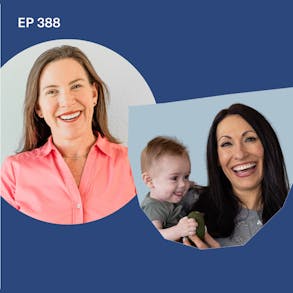
LISTEN TO THIS EPISODE
Episode Description
Is your baby yawning in the middle of their meals? Are they tired? …just bored of your food? What gives?! In this episode SLP Dawn Winkelmann is exploring some reasons about why your baby is yawning at the table…and it’s not what you think!
About the Guest
- Dawn Winkelmann, MS, CCC-SLP is a speech language pathologist specializing in pediatric swallowing
- She is the award-winning product designer for ezpz and created the Tiny Cup and Tiny Spoons for baby-led weaning
- Dawn is passionate about helping babies start solid foods safely

Links from this Episode
- Follow Dawn on Instagram @msdawnslp
- Dawn’s website: https://www.msdawnslp.com/
- Dawn’s feeding blog on ezpz: https://ezpzfun.com/pages/blog
- Baby-Led Weaning with Katie Ferraro program with the 100 First Foods™ Daily Meal Plan, join here: https://babyledweaning.co/program
- Baby-Led Weaning for Beginners free online workshop with 100 First Foods™ list to all attendees, register here: https://babyledweaning.co/baby-led-weaning-for-beginners
Other episodes related to this topic:
- Episode 377 - Safe High Chair Positioning
- Episode 7 - Why Your Baby’s High Chair Needs a Footrest
- Episode 261 - DIY High Chair Hacks for Safer Baby-Led Weaning

Latest Episodes
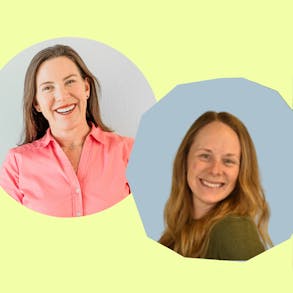
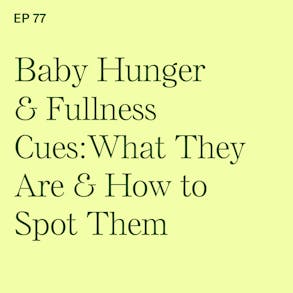
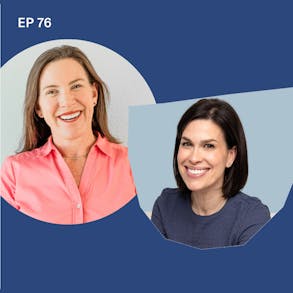
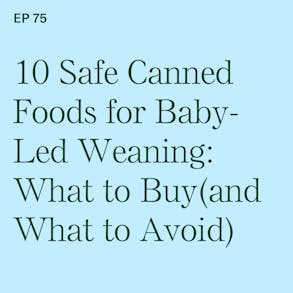
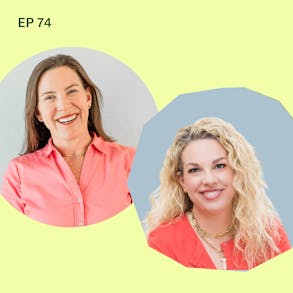
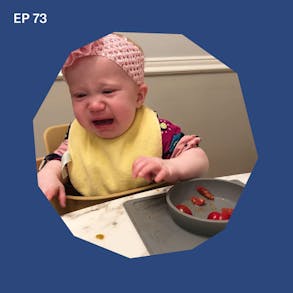
Katie Ferraro (0s):
Just got back from a Thanksgiving road trip. We drove to see my husband's family in Texas. So I have a totally empty refrigerator at hom and five new foods that I need to prepare for my friend Carissa's Baby Ezra. So I'm making Ezra's 100 First Foods. I'm following my own 100 First Foods Daily Meal Plan. I've been working on revamping a lot of the recipes and kind of streamlining the grocery list. Oh, my gosh, groceries are so expensive and I wanna bring the cost down of making these foods for your baby. We're on week 13 now. He's having foods number 61 to 65 and I'm looking through the daily recipes for this week and the weekly grocery list and I'm really glad that they are pretty easy foods this week 'cause I feel like I need a break in the kitchen. So the five new foods that Ezra is having this week, just to update you in case you've been following along. he's having a new fruit every Monday we're doing blueberries.
Katie Ferraro (42s):
So I've got this blueberry ricotta lemon pancake coming his way. We do a new vegetable on Tuesday. So that's peas. I have a pea fritter recipe that I just tweaked 'cause we don't offer small sized pieces of foods like peas to early eaters. And, even though Ezra is nine months now, he still doesn't have his grasp, which is fine. He's gonna love these fritters and be able to self-feed them. We do a new starchy food every Wednesday, so it's a little bit of a wacky whole grain. It's the whole grain Kamut that we're having, but the kamut quiche recipe I made is so easy. Thursday, new protein food, we're doing chickpeas. As we work our way through the second half of the protein list, it's all the plant proteins. I have a super easy homemade chickpea hummus recipe. It's way lower in salt than anything you can buy at the store. And then on Friday, we do a new allergenic food of the week.
Katie Ferraro (1m 23s):
This is one of my favorite baby-led weaning foods. It's sardines. You guys, sardines are like a super easy way to reintroduce your baby if you haven't already done it to the potentially allergenic food fin fish. So Ezra's had fish two other times already with multiple re-exposures from this program and now he's gonna have sardines. If you want to follow the same 100 First Foods Daily Meal Plan that we're doing, it's all part of my Baby-Led Weaning with Katie Ferraro Program. I've got the exact sequence of foods to feed plus my 100 First Foods content library so you can see and learn and watch all the videos on how to prepare these foods safely 'cause I want your baby to eat 100 foods before turning one. You can follow this exact meal plan. You can try all of the new foods and recipes too when you sign up at babyledweaning.co/program again, that's babyledweaning.co/program and I hope to see you there.
Katie Ferraro (2m 9s):
Are you planning to buy your baby any holiday gifts this year? If you are in full swing shopping mode, I wanna share my 2023 holiday gift guide with you. I did a full roundup of all of the feeding gear that's gonna help make your babies transition to solid foods, a safe and easy one along with the current discount code so you can get the best deals. I know I get super overwhelmed by email this time of year and you don't have time to be tracking down discount codes. So if you need feeding stuff for your baby, check out the holiday feeding gift guide. It's all on my blog at babyledweaning.co/blog and happy feeding.
Dawn Winkelmann (2m 39s):
I'll share three reasons why I personally from my clinical experience, see babies yawn when eating. One is autonomic symptoms, the second is reflux symptoms and the third is fatigue symptoms.
Katie Ferraro (2m 52s):
Hey there I'm Katie Ferraro, Registered Dietitian, college nutrition professor, and mom of seven specializing in baby-led weaning here on the Baby-Led Weaning Made Easy podcast I help you strip out all of the noise and nonsense about feeding, leading you with the confidence and knowledge you need to give your baby a safe start to solid foods using baby-led weaning. Here's a weird phenomenon you might have experienced your baby yawning at mealtime. Why are they yawning? Are they tired? Are they bored of your food? What's going on when my baby yawns at mealtime? Since yawning has to do with the mouth, I added it to my list of weird feeding mouth stuff questions to ask Dawn Winkelmann the next time she's on the podcast, which is today.
Katie Ferraro (3m 40s):
Dawn is my friend and colleague. She's a fellow baby-led weaning expert. She's a speech language pathologist and a pediatric swallowing specialist. And Dawn is also the product designer for the company ezpz. So she makes developmental feeding gear such as the award-winning ezpz tiny cup, the ezpz tiny spoon, both of which are used for independent self-feeding in infancy. If you want to check out some of the ezpz feeding gear, my affiliate discount code KATIE10 always works for 10% off at ezpzfun.com and Dawn is here to help us understand what might be going on when we see our baby yawning during meal time.
Dawn Winkelmann (4m 22s):
Thank you Katie for having me.
Katie Ferraro (4m 24s):
It's been a little bit of a while since we chatted. Tell me what you're working on in the infant feeding space these days please.
Dawn Winkelmann (4m 30s):
You are gonna be so excited to hear this, but I have two new pre-feeding designs coming out in Q1 next year and one baby-led weaning design launching then as well. So of course you and your community will be the first to know all the details.
Katie Ferraro (4m 46s):
Oh, I'm so excited. I'm always like, what's she gonna come up with next then I guess and I'm way off. I did guess breast milk popsicle though, because you used to talk about 'em all the time and I know, we call them the tiny pops and you can put other things in there besides breast milk. But I love the new pre-feeding products that ezpz has been coming out with. I think it's so helpful for parents who are like anxious to get started but know that they shouldn't offer their baby anything to except breast milk or formula until their baby's ready to start solid food. So I can't wait to see. That'll be out what the beginning of 2024?
Dawn Winkelmann (5m 13s):
Yes.
Katie Ferraro (5m 13s):
So Dawn, I have this running list of questions on this notes app on my phone. The parents ask and I'm always like, Ooh, this is a question I have to ask Dawn. So that's the impetus for this quick episode. Dawn, why does my baby yawn during mealtimes? Please tell us what's the deal with yawning
Dawn Winkelmann (5m 29s):
So I actually get this question a lot from parents that I work with and I'll share three reasons why I, personally from my clinical experience, see babies yawn when eating. One is autonomic symptoms, the second is reflux symptoms, and the third is fatigue symptoms. And I'll just go more into that. So autonomic symptoms are basically when we have involuntary responses related to the nervous system. I'll give you an example. So my preterm or NICU babies, they tend to communicate pain or discomfort by like hiccuping or yawning and our full-term babies just cry to kind of communicate that.
Dawn Winkelmann (6m 11s):
Now fast forward six and a half months or seven months or maybe even eight months later, these babies are starting solids and I tend to see the same yawning or hiccuping responses. So I just educate my NICU parents, you know about this possibility. So they kind of know what to expect. And then the second reason is reflux symptoms. So as an infant swallowing specialist, I consistently remind parents that you know, one of the signs of reflux is yawning. So when a baby yawns a lot, it could be that they're trying to contract their throat muscles to kind of decrease discomfort or pain commonly associated with reflux. So if you find that your baby is yawning a lot and not swallowing very much so really not swallowing that food, it could be reflux.
Dawn Winkelmann (6m 57s):
So I just tell the families that I work with to ask their pediatrician for a referral to a speech language pathologist or an occupational therapist that specialize in feeding to help with reflux symptoms and swallowing therapy. One or two sessions can literally be life changing for your baby and for them as well. And then the third reason is fatigue symptoms. So I love to just tell families that the act of swallowing is a complex process that involves 26 muscles and 5 cranial nerves. So eating and drinking requires a lot of effort for our babies and they're growing, they're developing, they're eating, they're drinking. And a combination of all this can just get really exhaustion, exhausting.
Dawn Winkelmann (7m 40s):
So, I, yawn too. I mean it is, it is a lot of work for these babies and you know I always explain that when we tell them to like, hey swallow one more time or just have one more bite. Like we're asking our babies to engage those 26 muscles and 5 cranial nerves again for that one more bite.
Katie Ferraro (8m 0s):
Hey, we're gonna take a quick break, but I'll be right back.
Katie Ferraro (10m 9s):
So let's talk a little bit more about the fatigue symptoms because I mean it is sometimes it's funny, I know I work with parents and the babies are just starting out in solid foods. We do a lot of like the first 10 days together and the parents will be like, what do you mean the baby's tired? He hasn't really done anything and I was like, oh my gosh, he's sitting and sucking and swallowing and breathing and now touching food and reaching over here and smashing in his ear. It's actually a lot and 15-20 minutes into it some of these babies are just pooped. Can you talk a little bit about how long can you anticipate your baby sitting in a high chair? And obviously every baby's different, but maybe just a typically developing baby and I know in feeding therapy you're, you're someone's working with a different population, but how long can parents of typically developing babies expect their baby to sit in the high chair before these fatigue symptoms set in?
Dawn Winkelmann (10m 55s):
Yeah, so most of the babies that I work with are typically typical developing and so they should be able to sit for 15 to 20 minutes. You know, holding themselves up and being able to engage in things like, you know, mouthing tools or cup drinking or feeding or using a spoon. And so we want babies to be able to not only sit for 15 and 20 minutes but actually be able to lean forward and engage. And that is really important for parents to kind of understand too. And we were talking about, you know, them getting fatigued is that they're using their core muscles, they're using their fine motor movements, they're using gross motor movements with their feet and really engaging in that footrest, they're crossing midline, they're engaging their sensory system and then they're also trying to eat and swallow.
Dawn Winkelmann (11m 44s):
So this is really complex. It's actually the most sensory and motor involved actions that the child does throughout the whole entire day. So it is also the foundation. You always hear me if you're, if, if you've heard me before on Katie's podcast, you always hear me saying, you know, feeding milestones, pre-seed speech milestones. So feeding milestones really are the foundation to speech and language and cognition and a lot of fine motor movements and gross motor movements and, and the act of, you know, swallowing in their saliva and decreasing drooling and all of these changes. And every single day your baby gets into that highchair, they are growing.
Dawn Winkelmann (12m 27s):
So that tongue is a little bit bigger, that mouth is a little bit bigger, they have, you know, their fingers are getting a little bit longer so it's inconsistent. So that can be very fatiguing for baby. You know, yesterday they were able to grab that avocado slice with no problem. Today their fingers are a little bit longer, that's a little bit more challenging or their torso grew a little bit more so now they're shoving that avocado piece into their chin instead of into their mouth. So it really can be overwhelming for baby and of course overwhelming for us as caregivers, but it can be really challenging for them and, and if parents don't realize like, you know, hey this is all changing all the time, that it can be a little exhausting for parents as well.
Katie Ferraro (13m 9s):
And you mentioned it a little bit earlier, you're always talking and reminding us like these feeding milestones that your babies are working on right now, they come ahead of the speech milestones, which are gonna be coming up in your baby's development next. So Dawn, can you remind us what things can we be doing at the table that are really gonna be helping our babies with talking down the road?
Dawn Winkelmann (13m 27s):
Yeah, so there's several things, but I'll just highlight three things that parents can do to kind of prepare for this next stage. You know, what can they do at the table to kind of help their babies with evolving speech skills? And the first thing is to work on pre-feeding skills. Now pre-feeding skills are capabilities that your baby can practice in preparation for eating and drinking. A few of these skills are like lip closure or tongue elevation or hand to mouth skills. and I actually designed the ezpz oral development tools, which are a set of three baby-led mouthing tools that actually help baby with some of these pre-feeding and also feeding activities.
Dawn Winkelmann (14m 7s):
Remember again, feeding milestones, pre-seed speech milestones, so we have to work on that pre-feeding development and then feeding development, which will lead to speech development because of course the mouth, the hands, you know, the tongue, the lips, all of those engage the oral cavity to do the pre-feeding, you know, movements to do the feeding movements and then of course to utilize that for speech. In addition to that, we're also adding in respiration, right? So as you see your baby doing pre-feeding movements, so, so they're chewing on that oral development tool, you're gonna hear them ha ha ha kind of really working on the respiration and those pre-feeding skills.
Dawn Winkelmann (14m 50s):
You may hear those same kind of sounds as your baby starts to eat for the first time. So as they're starting to chew you'll hear them like, ah, like sigh or again yawn or take a deep breath. And being able to have these developmental skills occur that's actually gonna help them control their respiration in order to be able to phonate and be able to have speech. So then you can hear some of that babbling and being able to have those first words. So these pre-feeding experiences can actually define a path for development and actually hone in the skills needed for successful eating and then speaking.
Katie Ferraro (15m 26s):
Hey we're gonna take a quick break, but I'll be right back. Okay, so you mentioned three things that we can do with our babies. The first one is the pre-feeding skills. What are the other two as far as helping them with their speech milestones?
Dawn Winkelmann (15m 46s):
Yeah, so they can next focus on open cup drinking. So having baby drink from an open cup held by a caregiver can actually facilitate speech development since it promotes lip closure. So lip closure is a movement that we use to produce the m, p, and b sounds in English, Spanish, and many other language. So those sounds those lips are closing to kind of make those sounds. And so of course it's no surprise that if you're working on open cup drinking that these speech sounds will actually help produce baby's first words, which you know can include mama papa bye bye because we're actually working on that.
Katie Ferraro (16m 30s):
Okay, so pre-feeding skills, open cup drinking, and what else Dawn?
Dawn Winkelmann (16m 34s):
The last one would be avoiding sippy cups. So of course, you know, again, I, I feel like I'm constantly preaching this, but it really, it really is essential for families to really consider not adding sippy cups in their child's feeding. And this is because the tongue is placed in a forward position with the sippy cup, which can misshape the oral cavity, which may lead to speech delays, difficulties chewing, difficulties with picky eating, having food you know come out of the mouth, encouraging that tongue thrust, which can be very overwhelming for the babies to be working so hard and having that food continuously come out of the mouth.
Dawn Winkelmann (17m 16s):
And also be very discouraging for parents who are like, I'm, you know, making all this food and my baby's not swallowing anything. Without them knowing that because they're using a sippy cup, it's really training that tongue to push forward. And so it's not that the baby doesn't love your food and it's not that the baby can't swallow, it's really because you know, with the use of sippy cup we're kind of motor planning that tongue movement that is inappropriate.
Katie Ferraro (17m 44s):
So Dawn, I really appreciate this 'cause sometimes these things you see and you're just like, is this normal? Is this not? And it's so important that, I love your perspective 'cause you're working with both typically developing babies, you've also seen babies in a feeding therapy setting, and sometimes it can be something as little as, huh, your baby's a little bit fatigued. But it's also a nice reminder that there are these different skill sets we can be doing with our baby to help them get ready for the next phase, which is gonna be talking. So before we close out here, tell us where our audience can go to learn more about your work and what can we do to support you and your small business?
Dawn Winkelmann (18m 14s):
Oh, thanks Katie. They can go to msdawnslp.com to sign up for one-on-one parent coaching or follow me on social at MissDawnSLP. They can also go to ezpzfun.com and check out the feeding products that I designed. Of course you can use Katie's code, which is KATIE10 for 10% off at everything at ezpzfun.com.
Katie Ferraro (18m 37s):
Thank you Dawn, it's always great chatting with you. I appreciate your time and your insight here.
Dawn Winkelmann (18m 40s):
Thank you so much Katie for having me.
Katie Ferraro (18m 43s):
Well, I hope you guys enjoyed that interview with Dawn Winkelmann. She always is such a wealth of information. I'll link up all of the resources that Dawn shared on the Shownotes page for this episode, which you can find at BLWpodcast.com/388. And a special thank you to our partners at AirWave Media. AirWave Media produces podcasts that feature food and science in using your brain. Check them out at AirWave or online at BLW podcast.com. Thank you so much for listening and I'll see you next time If you're interested in doing baby-led weaning, but you're not exactly sure, like what does that mean?
Katie Ferraro (19m 26s):
What does it look like? Where do I start? My online program called Baby-Led Weaning with Katie ferraro has everything you need to give your baby a safe start to solid foods and get them to eat over 100 foods before they turn one, whether you're terrified of choking or maybe you've started but you feel like you're feeding your baby the same foods over and over 'cause you don't know what to feed next or you're looking for guidance on how to prepare foods safely for your baby's age and stage. My program has exactly what you need. There's five hours of concise self-paced video training. You can knock this thing out during nap time this week. You also get access to my 100 First Foods content library so you can see and learn exactly how to prep all of the a hundred foods as well as my original 100 days meal plan. I've been refining this program for the last seven years.
Katie Ferraro (20m 8s):
Just today, a mom wrote to me and told me that the 100 days meal plan has been a game changer for her busy lifestyle. When you join the program, you also get access to over 100 phase two combination food recipes. So you're gonna try out the trickier textures, push your baby's palate. And what's cool about these recipes is your whole family will enjoy them. So everything you need to give your baby a safe start to solid foods is inside of the program. It's created by me, a Registered Dietitian who specializes in infant feeding. If you're tired of hunting and pecking around the internet trying to piece this stuff together on your own, I put it all in one convenient place for you. I invite you to check out the Baby-Led Weaning with Katie Ferraro program that's at babyledweaning.co again, that website is babyledweaning.co and click on program to learn more.

The Program Baby-Led Weaning with Katie Ferraro
A step-by-step digital program for starting solid foods safely and navigating the original 100 FIRST FOODS™ meal plan with baby-led weaning.
 EXPERT-LED, PROVEN APPROACH TO EATING REAL FOOD
EXPERT-LED, PROVEN APPROACH TO EATING REAL FOOD CONCISE VIDEO TRAININGS TO MASTER BABY-LED WEANING
CONCISE VIDEO TRAININGS TO MASTER BABY-LED WEANING 100 FIRST FOODS DAILY MEAL PLAN WITH FOOD PREP VIDEOS
100 FIRST FOODS DAILY MEAL PLAN WITH FOOD PREP VIDEOS
Baby-Led Weaning for Beginners Free Workshop
Is your baby ready to start solid foods, but you’re not sure where to start? Get ready to give your baby a solid foundation to a lifetime of loving real food…even if you’re feeling overwhelmed or confused about this next stage of infant feeding.
Get baby-led weaning recipes and tips delivered to your email inbox.

